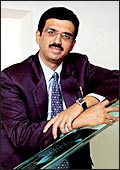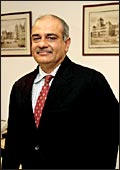 |
"India is a long-term
story for us. It's not a five year business, but a 25-yr one
or even more"
Eric Dhoste
CCO, Societe Generale Bank |
After
over two decades in India, in 2002 Deutsche Bank of Germany quietly
folded its single-branch Indian retail banking operation. Around
the same time, French Bank BNP Paribas was hogging the headlines
in India for retrenching hundreds of employees at its retail banking
division. These two events in early 2000 flashed a cautionary
message to international bankers to go slow on India. But little
did they realise that a dramatic turnaround was in store, which
forced Deutsche Bank to re-launch its India retail banking operations
in India in October 2005.
In the same month, BNP Paribas too returned
with a 49.9 per cent stake in Sundaram Asset Management Company.
Just two months back, BNP inked a deal with south-based Geojit
Securities Ltd for a 33.3 per cent equity stake. BNP is still
scouting for more such opportunities. Perhaps the duo had earlier
misjudged the retail boom in India or the thought of finding alternative
growth avenues (other than by bringing in foreign direct investment
or by setting up branches, both of which are restricted) never
occurred to them.
Deutsche and BNP Paribas aren't the only
foreign banks that limited their presence and remained virtually
mute spectators in India, even as the big boys like Citi, Standard
Chartered and HSBC went about consolidating their presence. Call
them the second rung of foreign banks in India-although they're
powerhouses in their own right on the global stage-but along with
Deutsche and BNP, banks like Societe Generale (SG), DBS Barclays
and Bank of Nova Scotia are finally stirring up on domestic shores,
after years of a truncated, tentative India presence. And joining
them in their quest for a large Indian footprint are new entrants
like Macquarie Bank of Australia. The opportunities are manifold,
beginning right with corporate banking, and small & medium
enterprises (SMEs), to retail banking and consumer finance via
non-banking finance companies (NBFCs), to wealth management, asset
management and investment banking. Much of the action in these
spaces is taking place via the inorganic route.
The heightened level of interest can be gauged
from the number of global bank CEO visits to India. Daniel Bouton,
Chairman of the France-headquartered SG (the same bank that was
one of the advisors to L.N. Mittal in the Arcelor buyout), was
in India in November-end, along with a dozen of his senior management
team. Never in the history of SG has such a high-level delegation
spent a week in a single country. Says Eric Dhoste, Chief Country
Officer (India) at SG, who is just three months young in India:
"The capital invested in India is a token money. As we expand
and regulation allows branch expansion, we will put in more money."
Ditto for the rest of the foreign bank pack, which has signed
small cheques and remains happy with fledgling operations. "India
is a long-term story for us. It's not five-year business, but
a 25-year one or even more," adds Dhoste, echoing the sentiment
of the foreign banking community. In March, Macquarie launched
its Indian operations at the hands of none other than Australian
Prime Minister John Howard, who was in India on an official visit.
Steve Waugh, former Australian cricket captain, also added to
the glamour (Waugh is ambassador for Macquarie's banking and property
group).
 |
"We will leverage our
existing India relationships as well as our global relationships
with MNCs"
Samir Bhatia
MD, Barclays India |
Acquisitions and Alliances
The strategy for the Indian B-team of foreign
banks is to scale up operations organically and look for alliance
opportunities wherever possible, in the arenas of NBFCs, asset
management, broking and insurance. "Our aspiration is to
become a material commercial bank in India," says Pranam
Wahi, Chief Executive Officer at DBS, which is the largest Singapore
bank. Last June, DBS acquired a 37.5 per cent equity stake in
Cholamandalam Investment & Finance Company, which operates
from 120 locations. In one stroke, DBS also gained access to three
other Chola subsidiaries with interests in asset management, retail
broking and third-party distribution of financial products. "We
expanded the NBFC business from solely a truck financer to pure
consumer loans. That's our vehicle for consumer finance in India,"
says Wahi, who came on board just two-and-half-years back from
HSBC, where he worked for over two decades. DBS has put itself
on a platform, which can be scaled up very fast as soon as it
gets fresh licences. "It's a mix of opportunities within
the banking platform coupled with our partnership with Chola for
consumer finance," says Wahi, whose bank has two branches
in Delhi and Mumbai with 200 people. Apart from corporate banking
and consumer finance, DBS' immediate new priorities in India include
building a wealth management business for the mass affluent and
a custody business (where it is looking at capitalising on its
Asian linkages).
Barclays, which is the UK's largest bank,
has trained its sights on corporate and commercial banking. It
has poached Samir Bhatia from the second largest private sector
bank, HDFC Bank, where Bhatia was heading the corporate banking
portfolio. Barclays is now spreading its wings in areas like SMEs,
supply chain management, structured trade finance, asset finance
and cash management. Bhatia, MD (International Retail and Commercial
Banking), Barclays Bank, says: "We have a huge pool of existing
relationships in India. We will also leverage on the strength
of our global relationships with multinationals. This, combined
with a strong relationship of our corporate banking team, will
help in building a strong business in India." Barclays has
already announced an investment of $150 million (Rs 675 crore)
for expanding in investment banking, and a further $70 million
(Rs 315 crore) for its corporate and commercial banking business.
Keeping financial inclusion in mind, "the bank is building
a robust agri-business model," says Bhatia who has set up
a team of 77 people in just six months. Bhatia reveals that the
retail banking rollout will happen by the first quarter of next
year.
 |
"The NBFC business has
been expanded to become our vehicle for consumer finance in
India"
Pranam Wahi
Country Head, DBS |
Amongst the B-team pack, Barclay's balance
sheet appears the healthiest. Profits have almost doubled in 2006
from Rs 62 crore to Rs 122 crore. What's more, the net profit
of Barclays is more than that of many new generation private sector
banks like Kotak Mahindra Bank, IndusInd Bank and Yes Bank. It's
the possibility of such rapid growth that's prompted SG, which
has traditionally been a corporate banking player in India, to
eye the lucrative consumer finance business. "We need to
build a brand first. Retail is a proximity business. You need
critical mass," believes Dhoste. That's why the French bank
has bought 75 per cent along with its partner Burman of Dabur
in the Kolkota-headquartered Apeejay Finance, a 13-year-old NVFC.
"We will also be increasing our footprint in businesses like
structured finance, insurance, asset management, consumer lending
and derivatives," adds Dhoste. SG also has a 300-seater BPO
operation in Bangalore as well as a car fleet leasing business
in India, both of which are in expansion mode.
Canadian Bank of Nova Scotia is yet another
international bank looking to expand its Indian footprint. The
bank, known for wholesale trading of gold, has just witnessed
a turnaround in 2006 from a loss of Rs 12 crore in 2005 to a profit
of Rs 32 crore (see How They Stack Up in India). The bank, which
has been around for over two decades in India, now plans to approach
the Reserve Bank for more licences to expand its retail, especially
marketing of gold, as well as corporate banking operations.
The newest entrant, Macquarie, is testing
Indian waters with an investment banking and equity sales arm.
The banking foray may follow if the two new ventures deliver.
"There is a huge opportunity in the M&A space and in
the funds segment which is fast developing in India," says
Varun Bajpai, Managing Director (Corporate Finance) at Macquarie
India. Macquarie is eyeing the big-ticket real estate and infrastructure
sectors.
Clearly, the NBFC route along with stakes
in asset management and broking arms is emerging as a scalable
model for foreign banks. At least for the time being. If the Central
Bank does allow foreign banks to buy into their Indian counter-parts
post-2008-according to a roadmap outlined-the ball game will change
and the B-team will be better placed to take on the Citis and
HSBCs of India by taking over under-capitalised Indian banks (and
there are quite a few of them). They may be small today in India,
but don't underestimate their global financial muscle. SG, for
instance, recently made a bid for one of the China's largest banks,
Guangdong Bank (Citi eventually bagged it). And Macquarie is in
the news for making a takeover bid for Qantas Airways. Come 2009,
the Indian B-team may find itself in the thick of similar action.
|







